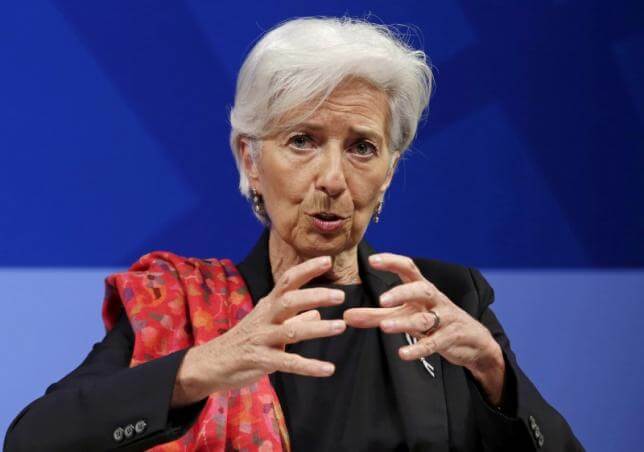Poul Thomsen, Greece and the cynicism of the IMF
by Daniel Munevar
15 February 2016
For the casual reader, Poul Thomsen’s recent piece |1| on the role of the IMF in the bailout review negotiations currently taking place between Greece and the Troika would seem balanced and reasonable. At the end of the day, as he has argued elsewhere, |2| the numbers simply need to add up. For that there is a tradeoff between the “ambition of the reforms” Greece needs to impose and the amount of debt relief that can be granted by its European partners. In blunt terms, more austerity implies less debt relief and vice versa. Thomsen argues that given the contentious character of the negotiations the IMF is simply there as a friendly companion that supports both its Greek and European partners to help them make the tough decisions required to develop a program that adds up. However, for someone who is more familiar with the role that the IMF in general, and Thomsen in particular, has played in placing Greece in the precarious situation that it finds itself today, his piece can only be defined as brazen and cynical.
| Who is Poul Thomsen? Poul Thomsen (Denmark) is currently the Director of the IMF’s European Department. He joined the IMF in 1982 and since he represented Fund´s missions in Slovenia, Macedonia, Romania, Russia, and Poland. More recently, he negotiated the current Stand-By agreements of the IMF with Greece and Iceland. After the¨stellar success¨ of the program in Greece that started in 2010 he was promoted to his current capacity of Director where he also oversees the work of the IMF in Iceland, Romania and Ukraine. As such, he embodies Peter´s Principle which states that “managers rise to the level of their incompetence.” |
In order to unpack Thomsen argument, we need to go by parts:
“Ultimately a program must add up: the combination of reforms plus debt relief must give us and the international community reasonable assurances that by the end of Greece’s next program, after almost a decade of dependence on European and IMF assistance, Greece will finally be able to stand on its own”
Its interesting that Thomsen makes this argument now, when in 2010 he was directly responsible for the structure of the initial bailout agreement for Greece which did not include debt relief. Back then, even though several departments of the IMF had recommended a debt restructuring, Thomsen and the IMF European Department “believed a haircut should not even be considered at this juncture”. |3| When the IMF Board met in May of 2010 to approve the bailout package for Greece, Thomsen defended the program even though it was not possible to certify that it would ensure the sustainability of the debt. |4| As this was against the lending policies of the IMF, the board also approved a change in its rules so as to allow loans that do not ensure debt sustainability, as long as there is a “high risk of international systemic spillover effects”. |5| In simple terms, a loan beyond the economic capacity of a country to pay it back could be granted if it could help to avoid panic in international financial markets. Thus, from the beginning of this saga, both Thomsen and the IMF were aware that Greece was being granted a loan that couldn’t be expected to be paid back, and therefore had no hope of eventually being “able to stand on its own”.
“This said, no amount of pension reforms will make Greece’s debt sustainable without debt relief, and no amount of debt relief will make Greece’s pension system sustainable without pension reforms. Both need to come about.”
Once the original program had gone off track in 2012, debt restructuring became unavoidable. At this point, foreign creditors had been able to reduce their exposure on Greece by about €90 billion euros thanks to the funding provided by the first bailout. Furthermore, once debt restructuring was completed, Greek banks were fully protected from the losses derived from their holdings of government debt. However, domestic pension funds were not. As a result of the debt restructuring of 2012, it is estimated that pension funds lost €14.5 billion. |6| This sizable hit on the assets of the pension system constitutes one of the main factors that have undermined its sustainability. It is possible to say then that the delayed debt relief provided to Greece came precisely at the expense of the pension system of the country.
“There is no doubt that both Greece and its European partners will face politically difficult decisions in the coming months to arrive at a program that is viable—one that adds up.
Such difficult decisions cannot be “kicked down the road” through unrealistic assumptions.”
It is interesting that Thomsen highlights the role of unrealistic assumptions in kicking the can down the road, as this was exactly what the IMF has done over the last five years. For example, the first adjustment program, personally approved by Thomsen, was based on the assumption that Greece was going to be able to achieve and sustain a primary fiscal surplus of 6% of GDP in the medium term. |7| It was clearly absurd to expect that any country could achieve this type of fiscal adjustment but, in order for the numbers to add up, that was the other side of the coin of excluding debt relief. Furthermore, despite the problems associated with this approach, the IMF has continued to base its assessments on it: the second adjustment program assumed a medium term target of primary surplus 4.5%, whereas the third program assumes one of 3.5% for the next several decades. |8| On the face of historical evidence, where no country has been ever close to achieve such a large and sustained adjustment, it begs the question of why the IMF continues to endorse this futile exercise of can-kicking. |9|
“Thus, assuming that Greece can simply grow out of its debt problem without debt relief—by rapidly transitioning from the lowest to the highest productivity growth within the euro zone—is not credible.”
As it happens, this was exactly the basic assumption underlying the growth projections for Greece for the first two programs. In theory, the full implementation of the structural reforms would allow the country to “go from having the lowest average TFP growth in the euro area since it joined the EU in 1981 to having among the highest TFP growth, and that it would go to the highest labor force participation rates and to German employment rates” |10| Its important to highlight that research conducted by the IMF itself has shown that some of the structural reforms which the organization has emphasized over the last decades, and quarreled about with the Greek government such as labor market reform, have no or negative impact over TFP and growth. |11|
“Why the focus on pension reforms? Despite the pension reforms of 2010 and 2012, Greece’s pension system remains unaffordably generous.”
Let’s leave aside for a moment the fact that a system in which 45% of the pensioners in the country live below the poverty line can hardly be defined as generous. |12| Instead, let’s just focus on the macroeconomic impact of austerity on the sustainability of the pension system. First, expenditure on pensions by the Greek government was reduced from €21.7 billion to €17.1 billion between 2011 and 2014 – a reduction of 21%. |13| The reason why despite these massive cuts we fail to observe a reduction of expenditure in pensions as share of GDP is simply because the pace of contraction of the economy was even faster than that of the cuts. Second, the rapid growth of unemployment caused by the crisis has decimated the contributions that are the lifeline of the pension system. As a result of the reduction of nearly 1 million people in the labor force, said contributions have declined from €22 billion in 2009 to €16 billion in 2016. |14| Third, the reduction in contributions can also be attributed to the reduction of wages that is integral to the strategy of internal devaluation. For example, in the case of the biggest pension fund of the country, the average salary of its members dropped from €13300 in 2009 to €10300 in 2014. |15| Thus, even though an argument can be made regarding the need to address the institutional failures of the Greek pension system, it would also be important for the IMF to recognize the negative impact of its policies on the sustainability of the system.
“But can’t Greece protect pensioners by cutting somewhere else or increasing tax rates? There is some scope for those measures, but it is very limited. Most other spending has already been cut to the bone in an effort to protect pensions and social payments… Greece will need to take measures in the order of some 4-5 percent of GDP. We cannot see how Greece can do so without major savings on pensions.”
The reason why other spending has already been cut to the bone is that Greece has undertaken the largest fiscal adjustment in the developed world: between 2009 and 2014, the cyclically adjusted primary balance showed an improvement of 19% of GDP. |16| In the Eurozone, the closest country in terms of fiscal adjustment over the same period is Ireland with an adjustment of 10% of GDP. Furthermore, a result of this massive adjustment, GDP contracted by an almost equal amount making the fiscal effort effectively self-defeating. Thus, to ask of further adjustments when the country is already running one of the highest cyclically adjusted primary surplus in the developed world, is to effectively double down on what we already know is a failed strategy. |17| What it is hard to see then is how this can be taken as the basis of sound policy making.
“Could a primary surplus target well below 3½ percent of GDP make the necessary pension reform less demanding? Perhaps, but that would necessitate more debt relief. This is understandably controversial among Greece’s European partners, in part because several of them are required to run similarly high surpluses to preserve debt sustainability, and in part because some of the countries that would be in effect paying for debt relief to Greece are poorer than Greece, paying much less generous pensions to their own people.”
It is a shame that Thomsen didn’t have the same concerns regarding international fairness and solidarity back in 2010, as he seems to have in 2016. Then, he had no problem in supporting a program that pooled IMF and European resources to, as a former Executive Director of the IMF has pointed out, save French and German banks with significant exposure to Greece. |18|Did he worried then about those poor countries that were being ask to lend €110 to Greece in order to save banks from France and Germany? Was he concerned about the fact that it was unlikely that those poor countries would ever see their money back? Perhaps. What we do know is that less than a month ago, the IMF changed again its lending policies in order to eliminate the systemic risk clause that allowed the approval of the different adjustment programs for Greece. When doing so, the IMF recognized that the systemic exemption that allowed it to lend beyond what could be economically justified “delayed the restoration of debt sustainability, impaired the prospects of success for the country’s economic policy program, and eroded safeguards for IMF resources”. |19| Even though this is the right thing to do, the effects of the flip-floping by the IMF will linger on: the bailed out French and German bankers will get to enjoy their golden retirements, Greek pensioners will continue to see their pensions being cut and creditors from those poor countries will probably never see their money back.
“The IMF does not want Greece to implement draconian fiscal adjustment in an already severely depressed economy. In fact, we have time and again been the ones arguing for a fiscal adjustment path that is more supportive of recovery in the near term and more realistic in the medium term.”
It’s incredible, to say the least, for Thomsen to claim that the IMF has been in favor of a more supportive path to fiscal adjustment when that was never the case, at least until July of 2015. Since 2010, the official position of the IMF has been that debt sustainability in Greece could be ensured as long as the government achieved the fiscal targets of the program, regardless of how realistic these actually were. |20| The first time that the IMF publicly acknowledged the problems with the adjustment program came as a result of the leak, on July 3rd of 2015, of a debt sustainability analysis prepared by the organization. In it, the IMF conceded the over optimistic nature of the assumptions used in previous assessments and pointed out that debt sustainability in Greece could only be achieved through further debt relief. Given the sensitive political nature of the message, the European members actively tried to block the official publication of the document by the IMF but pressure by the US and other country members ensured it was released to the public. |21| One is left to wonder thus when and where exactly has the IMF argued in favor of a more realistic fiscal adjustment in the specific case of Greece.
“While there is much scope for increasing productivity through reforms, the past six years have shown that the scope and pace of reforms acceptable to the Greek society is not commensurate with an early improvement of productivity and sustained high growth.”
One last thought. No one is demanding, nor expecting, an official apology for the damage done by IMF policies in Greece. Yet, the least Thomsen could do, out of basic decency, is to stop blaming its victims, the Greek society, for the institutional failures of the IMF.
Footnotes
|1| Thomsen, P. (2016). Greece: Toward a Workable Program | iMFdirect – The IMF Blog. Retrieved February 12, 2016, from https://blog-imfdirect.imf.org/2016/02/11/greece-toward-a-workable-program/
|2| Bloomberg. (2015). Meet One of the Most Hated Men in Greece – Bloomberg Business. Retrieved February 12, 2016, from http://www.bloomberg.com/news/articles/2015-05-27/target-of-greek-scorn-shapes-nation-s-fate-as-imf-s-storm-chaser
|3| Blustein, P. (2015). LAID LOW THE IMF, THE EURO ZONE AND THE FIRST RESCUE OF GREECE, CIGI PAPERS NO. 61 — APRIL 2015. Retrieved June 12, 2015, from https://goo.gl/lvRKFE
|4| Ibid.
|5| Ibid.
|6| Debt Truth Committee Hellenic Parliament. (2015). Truth Committee on Public Debt. Retrieved from http://cadtm.org/IMG/pdf/Report.pdf
See also: Debt Truth Committee Hellenic Parliament, Eric Toussaint’s statement after his dialogue with Dimitris Stratoulis, Greek minister of pensions, 16 May 2015, http://cadtm.org/Eric-Toussaint-s-statement-after
|7| IMF. (2010). Greece: Staff Report on Request for Stand-By Arrangement, IMF Country Report No. 10/110. Retrieved February 12, 2016, from https://www.imf.org/external/pubs/ft/scr/2010/cr10110.pdf
|8| IMF. (2015). GREECE: AN UPDATE OF IMF STAFF’S PRELIMINARY PUBLIC DEBT SUSTAINABILITY ANALYSIS, IMF Country Report No. 15/186 . Retrieved February 12, 2016, from https://www.imf.org/external/pubs/ft/scr/2015/cr15186.pdf
|9| Eichengreen, B., & Panizza, U. (2015). A Surplus of Ambition: Can Europe Rely on Large Primary Surpluses to Solve its Debt Problem? Retrieved February 12, 2016, from http://www.nbp.pl/badania/seminaria/21i2015.pdf
|10| IMF. (2015). GREECE PRELIMINARY DRAFT DEBT SUSTAINABILITY ANALYSIS, IMF Country Report No. 15/165. Retrieved February 12, 2016, from https://www.imf.org/external/pubs/ft/scr/2015/cr15165.pdf.
|11| FT. (2015). Free Lunch: The good, the bad and the ugly in structural reform — FT.com. Retrieved February 12, 2016, from https://next.ft.com/content/e9c6e16e-e349-11e4-9a82-00144feab7de
|12| Macropolis. (2015). Greek pensions laid bare | MacroPolis. Retrieved February 13, 2016, from http://www.macropolis.gr/?i=portal.en.the-agora.2622
|13| Ibid.
|14| Macropolis. (2016). Greek pensions: The unsolvable equation | MacroPolis. Retrieved February 13, 2016, from http://www.macropolis.gr/?i=portal.en.the-agora.3629
|15| Ibid.
|16| The primary deficit is the balance of revenues minus expenditures, excluding interests. The cyclical adjustment to this measure allows to take into account the impact of changes in the macro environment on deficits. See, J.P. Morgan. (2015). Flows & Liquidity: Greek Pressures. Global Asset Allocation Report, 19th June of 2015.
|17| OECD. (2015). Government at a Glance 2015. Retrieved February 13, 2016, from http://www.oecd-ilibrary.org/docserver/download/4215081ec009.pdf?expires=1455399754&id=id&accname=guest&checksum=8526D4E958C852B46ED6644C942D61E6
|18| Zero Hedge. (2015). IMF Director Admits: Greek Bailout Was “To Save German & French Banks” | Zero Hedge. Retrieved February 13, 2016, from http://www.zerohedge.com/news/2015-03-04/imf-director-admits-greek-bailout-was-save-german-french-banks
|19| IMF. (2016). IMF Reforms Policy for Exceptional Access Lending. Retrieved February 13, 2016, from http://www.imf.org/external/pubs/ft/survey/so/2016/POL012916A.htm?hootPostID=504b9e60005ae162e7f390e049ce48e2
|20| FT Alphaville. (2015). IMF Debt Sustainability Assessments of Greece (and others) | FT Alphaville. Retrieved February 13, 2016, from http://ftalphaville.ft.com/2015/07/15/2134529/imf-debt-sustainability-assessments-of-greece-and-others/
|21| Reuters. (2015). Exclusive: Europeans tried to block IMF debt report on Greece: sources | Reuters. Retrieved February 13, 2016, from http://www.reuters.com/article/us-eurozone-greece-imf-idUSKCN0PD20120150703










